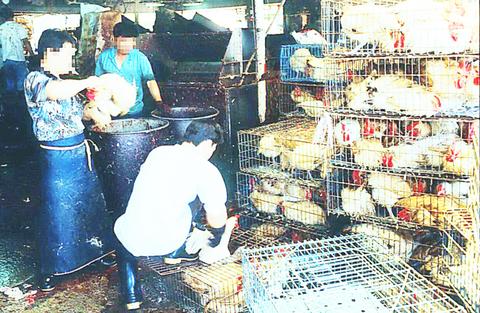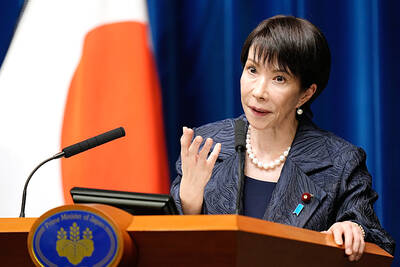Public health is being jeopardized by unsound slaughter regulations which allow the consumption of nearly 4 million unhealthy chickens a year, activists from animal conservation and environmental groups said yesterday.
The activists told a press conference in Taipei that the 170 million domestic chickens consumed each year in this country are slaughtered in traditional markets under unhygienic conditions.

PHOTO: THE ENVIRONMENT AND ANIMAL SOCIETY OF TAIWAN (EAST)
They said only 5 percent of the poultry are electrically slaughtered under conditions that meet the Chinese Agricultural Standards (CAS), a system that ensures the safety of agricultural products.
In the US, the activists said, about 2.3 percent of inferior slaughtered poultry meat would be thrown out.
"It implies that each year 3.91 million unhealthy chickens, which deserve to be thrown away, are eaten by consumers," said Chen Yu-min (
EAST members spent months making a documentary about chicken slaughtering in traditional markets -- and they said they were appalled by the lack of division between live chickens and killed ones.
"Most chickens have their throats cruelly cut by sharp knives and then are thrown into boiling water to remove their feathers before they have even breathed their last breath," said Shih Wu-hung (
Displaying photos and videotapes, activists said that waste-water contaminated by chicken giblets, feathers, chicken feces and blood was arbitrarily discharged in the markets.
"If the government doesn't regulate the slaughter of chickens, we're afraid that bird flu will hit Taiwan sooner or later," Chen said.
Two cases of bird flu reported in Hong Kong last week raised fears of another epidemic such as the one in 1997 that killed six people, forced the mass slaughter of millions of birds in the territory and briefly caused alarm about the possibility of a global epidemic.
Chen said that the bird flu virus is likely contracted by direct contact with chicken feces.
Jong De-shien (鍾德憲), associate professor of animal science at the National Taiwan University, told the press conference that a clear division is required at slaughtering plants between chicken carcasses, the gutted internal organs and waste matter.
Chen also said the frequent smuggling of poultry and agricultural products between Taiwan, China and Hong Kong have made this nation very vulnerable.
Chen criticized the government for excluding chicken slaughtering from the Husbandry Law (
The activists said that the Control Yuan should investigate the Council of Agriculture (COA) for its neglecting duties.
The COA's Bureau of Animal and Plant Health Inspection and Quarantine issued a press release yesterday afternoon, noting that 160 million broilers being slaughtered each year are examined and, on average, about 3 percent of them were discarded for not meeting standards.
The statement said that since last year the bureau has promoted the electronic slaughter of chickens and provides technical assistance to people who want to establish new slaughter houses.
The statement did not address the request to include poultry slaughter in the Husbandry Law.

The Ministry of Foreign Affairs (MOFA) yesterday voiced dissatisfaction with the Comprehensive and Progressive Agreement for Trans- Pacific Partnership (CPTPP), whose latest meeting, concluded earlier the same day, appeared not to address the country’s application. In a statement, MOFA said the CPTPP commission had "once again failed to fairly process Taiwan’s application," attributing the inaction to the bloc’s "succumbing to political pressure," without elaborating. Taiwan submitted its CPTPP application under the name "Separate Customs Territory of Taiwan, Penghu, Kinmen and Matsu" on Sept. 22, 2021 -- less than a week after China

THE GOOD WORD: More than 100 colleges on both sides of the Pacific will work together to bring students to Taiwan so they can learn Mandarin where it is spoken A total of 102 universities from Taiwan and the US are collaborating in a push to promote Taiwan as the first-choice place to learn Mandarin, with seven Mandarin learning centers stood up in the US to train and support teachers, the Foundation for International Cooperation in Higher Education of Taiwan (FICHET) said. At the annual convention of the American Council on the Teaching of Foreign Languages held over the weekend in New Orleans, Louisiana, a Taiwan Pavilion was jointly run by 17 representative teams from the FICHET, the Overseas Community Affairs Council, the Steering Committee for the Test of Proficiency-Huayu, the

A home-style restaurant opened by a Taiwanese woman in Quezon City in Metro Manila has been featured in the first-ever Michelin Guide honoring exceptional restaurants in the Philippines. The restaurant, Fong Wei Wu (豐味屋), was one of 74 eateries to receive a “Michelin Selected” honor in the guide, while one restaurant received two Michelin stars, eight received one star and 25 were awarded a “Bib Gourmand.” The guide, which was limited to restaurants in Metro Manila and Cebu, was published on Oct. 30. In an interview, Feng Wei Wu’s owner and chef, Linda, said that as a restaurateur in her 60s, receiving an

MORE RETALIATION: China would adopt a long-term pressure strategy to prevent other countries or future prime ministers following in Sanae Takaichi’s steps, an academic said Taiwan should maintain communications with Japan, as Japanese Prime Minister Sanae Takaichi is to lead a revision of security documents, Taiwanese academics said yesterday. Tensions have risen between Japan and China over remarks by Takaichi earlier this month that the use of force against Taiwan would constitute a “survival-threatening situation” for Japan. Prospect Foundation president Lai I-chung (賴怡忠) yesterday said Takaichi’s stance regarding Taiwan is the same as past Japanese prime ministers, but her position is clearer than that of her predecessors Fumio Kishida and Shigeru Ishiba. Although Japan views a “Taiwan contingency” as a “survival-threatening situation,” which would allow its military to